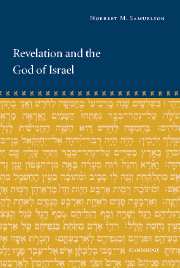1 - The God of Israel
Published online by Cambridge University Press: 22 September 2009
Summary
EQUIVOCALITIES
“Revelation”
Revelation, in its most general theological meaning, is a relationship between God and human beings in which communication takes place. As a form of relationship the word's meaning depends on the terms of the relationship – God and human beings. For Judaism the human beings involved are the Jewish people, the deity is in some significant sense identifiable with what the Hebrew Scriptures describe as “the God of Abraham, Isaac, and Jacob,” and the content of communication between what these terms designate is called “Torah.” Therefore, Judaism involves essentially an affirmation of the claims that God revealed himself to the Jewish people, and the Torah expresses that relationship. What this sentence means, however, is not in itself clear. Who is this God who reveals himself and who are the Jewish people who receive the communication? On how these two questions are answered depends what claim is being made and whether or not it is reasonable to affirm it. In this chapter I will focus exclusively on the meaning of the term “God.”
“God”
When people say “God” they mean many different things, not all of which are coherent. One important reason for the unclarity is that the word, which plays a central role in all expressions of the three Abrahamic religions (Judaism, Christianity, and Islam), has a long history of development, and through this history the meaning of the term has changed.
- Type
- Chapter
- Information
- Revelation and the God of Israel , pp. 11 - 21Publisher: Cambridge University PressPrint publication year: 2002

